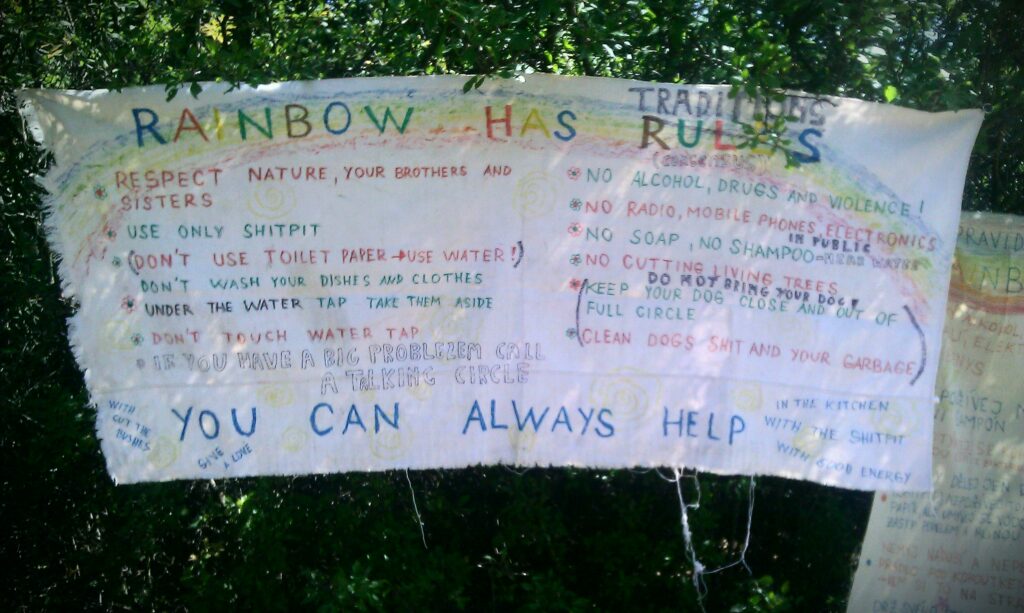
One of the most fascinating things about Rainbow Gatherings isn’t the food, the music, or even the politics – it’s the process. The invisible culture of how things get done. Spend some time in a Rainbow kitchen, or go on a mission for food supplies, and you’ll start to see two very different ways of organising humans in action. One works. One fails in beautiful and frustrating ways.
The shopping mission: A Case Study
Let’s say you’re headed to market to buy food for the kitchen. A crucial task. You need energy, coordination, and collective intention.
Rule one: don’t tag along with someone else’s crew. Form your own.
Why? Because crews are organisms, not schedules. Going with an existing crew means walking into dynamics you didn’t help shape. You’re a guest, not a co-creator. You may have opinions, but no influence. Frustration is inevitable.But go with your crew, formed from bonds of trust, shared experience, and a bit of laughter, and suddenly the chaos flows smoothly. You’re not fighting inertia, you’re moving together. This logic applies everywhere at Rainbow, from the kitchen to the fire circle to the compost pit.
Hard vs Soft Process
What we’re seeing here is the tension between hard organising and soft organising.
Hard Process
Open to all
Formalised roles
Meetings, plans, rules
Transparency as a virtue
Bureaucracy by defaultThis is what liberal society champions. It looks democratic, fair, and scalable. But in practice, it often just surfaces those who already have confidence, cultural capital, and practice at dominating spaces. In hard structures, the most forceful voices rise. The quieter, the hesitant, the new—these are drowned out or self-censor.
Soft Process
Based on trust and relationships
Closed but not exclusive
Grows from what already exists
Nurtures rather than commands
Invisible until you’re insideSoft organising is suspicious to many. It feels messy. It looks unaccountable. But it works because it builds from care. You know who you’re working with. You know what they’re good at. You aren’t managing people – you’re collaborating with them. And this is crucial: soft organising grows strong crews. You don’t recruit with a megaphone. You spot someone passing by, ask them to chop carrots or build a bench, because you’ve already seen them do something well. They come with a task in mind, and they stay because the connection is real.
Why soft builds better, hard, the insight: you can’t build anything strong using only hard organising. But soft organising can grow hard structures, when needed, and make them resilient. Hard organising, on its own, creates brittle forms. They might stand up, but they rarely endure. And when they fall, they leave no roots. They just vanish.
Soft organising builds roots. Deep ones. It surfaces overlooked skills, creates space for powerful people to step back, and gives new talent a chance to grow. It creates a culture where people can show up not with a résumé, but with presence and intention. From there, you can build all the structure you want. It will be flexible, not rigid. Adaptive, not defensive.
Learning from “Disorganisations” intentional communities, activist camps, temporary autonomous zones like Rainbow – these are spaces that function on the edge of collapse. Yet somehow, they often succeed in surprising ways. That’s because they use soft process to survive, even if they don’t always name it. Yes, they can be a mess. But they’re also laboratories. In their dysfunction, you’ll find hidden patterns that work: invisible flows of trust, leadership without authority, accountability without enforcement.
If we want to build humane, liberatory systems, whether tech, political, or social, we need to start here. Not with hierarchy. Not with paperwork. But with relationships, trust, and the soft skills most of our society has tried to forget.
Soft is not weak. Soft is the soil. It’s where the hard stuff grows.
Note: this is kinda dysfunctional, but It’s how things work, we need to balance these two things.